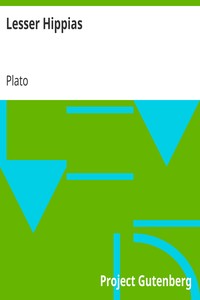Lesser Hippias by Plato
"Lesser Hippias" by Plato is a philosophical dialogue written in the classical era of ancient Greece, likely around the 4th century BC. This work can be categorized as a philosophical text, focusing on the themes of truth and deception in thought and speech, as highlighted through the exchange between Socrates and the Sophist Hippias. The dialogue explores the nature of wisdom, virtue, and the perspectives of Sophists who claim to have knowledge
and skill in various arts. In the text, Socrates engages Hippias, who boasts of his abilities and knowledge, particularly regarding the characters of Achilles and Odysseus from Homer's epics. Throughout their conversation, Socrates employs his dialectical method to peel away Hippias' assertions, demonstrating inconsistencies in Hippias’ definitions of truth and falsehood. The discussion reveals that both characters exhibit elements of truth and deception, challenging the notion that one is inherently superior to the other. Ultimately, the dialogue ends in ambiguity, reflecting the complex nature of wisdom and asserting that even those who appear to be learned can find themselves ensnared in their own arguments. (This is an automatically generated summary.)
Read or download for free
| How to read | Url | Size | |||
|---|---|---|---|---|---|
| Read now! | https://www.gutenberg.org/ebooks/1673.html.images | 90 kB | |||
| EPUB3 (E-readers incl. Send-to-Kindle) | https://www.gutenberg.org/ebooks/1673.epub3.images | 83 kB | |||
| EPUB (older E-readers) | https://www.gutenberg.org/ebooks/1673.epub.images | 81 kB | |||
| Kindle | https://www.gutenberg.org/ebooks/1673.kf8.images | 150 kB | |||
| older Kindles | https://www.gutenberg.org/ebooks/1673.kindle.images | 141 kB | |||
| Plain Text UTF-8 | https://www.gutenberg.org/ebooks/1673.txt.utf-8 | 73 kB | |||
| Download HTML (zip) | https://www.gutenberg.org/cache/epub/1673/pg1673-h.zip | 79 kB | |||
| There may be more files related to this item. | |||||
About this eBook
| Author | Plato (spurious and doubtful works), 428? BCE-348? BCE |
|---|---|
| Translator | Jowett, Benjamin, 1817-1893 |
| Title | Lesser Hippias |
| Note | Wikipedia page about this book: https://en.wikipedia.org/wiki/Hippias_Minor |
| Note | Socrates |
| Credits | Produced by Sue Asscher, and David Widger |
| Reading Level | Reading ease score: 62.9 (8th & 9th grade). Neither easy nor difficult to read. |
| Language | English |
| LoC Class | B: Philosophy, Psychology, Religion |
| LoC Class | PA: Language and Literatures: Classical Languages and Literature |
| Subject | Classical literature |
| Subject | Philosophy, Ancient |
| Category | Text |
| EBook-No. | 1673 |
| Release Date | Mar 1, 1999 |
| Most Recently Updated | Jan 16, 2013 |
| Copyright Status | Public domain in the USA. |
| Downloads | 338 downloads in the last 30 days. |
| Project Gutenberg eBooks are always free! | |

